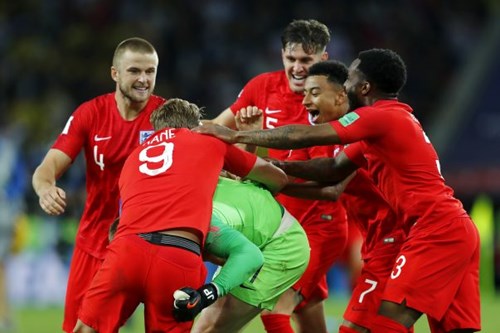Alan is a former professional himself, having played for Manchester United and Exeter City, before he was forced to retire at the age of 24. He’s since gone into academia and has a Master of Philosophy in Sport Psychology. Alan is currently undertaking a PhD on ‘exploring critical moments, identity and meaning amongst professional football players’.
Mention the words “penalty shoot-out” to any diehard England fan and you’ll most probably receive the same answer: “If it ever reaches that stage of a knockout tournament, we can kiss it goodbye!”
They can be rhymed off with ease: Germany in 1990, Germany again in 1996, Argentina two years later in 1998, Portugal in 2004 and 2006, and then Italy in 2012. In fact, there is no other country that has lost more penalty shoot-outs in major tournaments than England. So, what is the difficulty and why do elite level players find this particularly treacherous territory? I believe there are three particular issues worth discussing.

Goalkeeper Jordan Pickford is mobbed as England celebrate beating Colombia in the last 16 penalty shoot out.
The first point to consider is the weight of the above record. This can be a stumbling block when penalty shoot-outs rear their heads and as Samuel Taylor Coleridge would testify, an albatross hung around our necks. Over the past 28 years, the scenario has developed into some kind of conditioned thinking which doesn’t help our cause whatsoever. Old habits die hard indeed and I recall Big Sam (Allardyce) stating until this voodoo is smashed, it will keep going and going and the misery will keep piling up. The whistle blows to signal the end of extra time and it’s as if subconsciously the whole nation collapses under the strain and bides its time for the villain to emerge.
The second issue is the potential for some players’ minds to start becoming diluted with negative self-talk and negative imagery. The weight of expectation becomes heavier and the sobering thoughts of billions of people watching around the world can start to wreak havoc with the task in hand. This can start near the end of the game, when the whistle has gone after extra time, or more likely as you start your walk towards the spot. To the neutral, this can seem strange as the task is still the same whether no one is watching or eight billion are watching. However the danger is the players thinking processes are swiftly departing the moment. As opposed to focusing on the here and now, there can be a tendency for negative chatter to start and statements such as “please don’t miss” or “please don’t let it be me” entering the fray. These can quickly be followed by thoughts such as “please don’t let your family down” or “what will the media print if I miss?” All of a sudden your mind is a mile into the future and you’ve not even reached the ball yet! It can be likened to those Tom and Jerry cartoons that we all loved as youngsters (or Freud if you know your stuff!) where the angel and the devil are sat on your shoulder and the devil is sadly winning.
Jesse Lingard hugs Harry Kane after beating Colombia on penalties.
The third and final consideration is the mind and body connect, that the devil sat on the shoulder is doing their utmost to affect. Rio Ferdinand described vividly how he has experienced ‘spaghetti legs’ in the past and players, as opposed to staying secure, composed and calm in the moment, rush to get the task over to alleviate the incredible anxiety that has accrued. When anxiety is felt through some of the flawed thinking processes mentioned above, even the simplest of tasks can seem extraordinarily difficult. Under the most treacherous of circumstances, the mind can pedal backwards and return to the stage when the skill was first being learned. This leads to a potential breakdown in biomechanics (body movement) and your body feeling like it simply cannot do what you require it to do. Just striking the ball reasonably is an achievement in some circumstances. This could be a possible reason for some of the bizarre run ups we have seen in past penalty misses.
So what are the take home messages? Gary Neville has said throughout his excellent England career that he saw it all within past camps. There has been lots of practice, bits of practice, no practice, penalties spoken about, penalties not spoken about, lads who know who will be taking, volunteers who have been asked to step forwards in the moment. Whatever has been done previously, it has all added up to the same conclusion. With the exception of the European Championship quarter-final against Spain in 1996, England hadn’t conquered the art of the shoot-out. I have read that sport psychologists who have travelled with the England party have stated there will be selected personnel only around the players’ pre-penalties. This is to try and avoid the traps that the mind can start setting and to get them as secure, comfortable and relaxed as possible before a 12-yard kick of their life. Anything creative and slightly different is certainly worth a go.
So then, to conclude: the heartbeat is going crazy, the mind is a racing, friends and family are a praying, two billion people around the world are a watching, headlines are waiting to be written and team mates are depending. So it’s testament to the current England squad that they overcame all of this to conquer Colombia in a nervous shoot-out in Moscow.
















